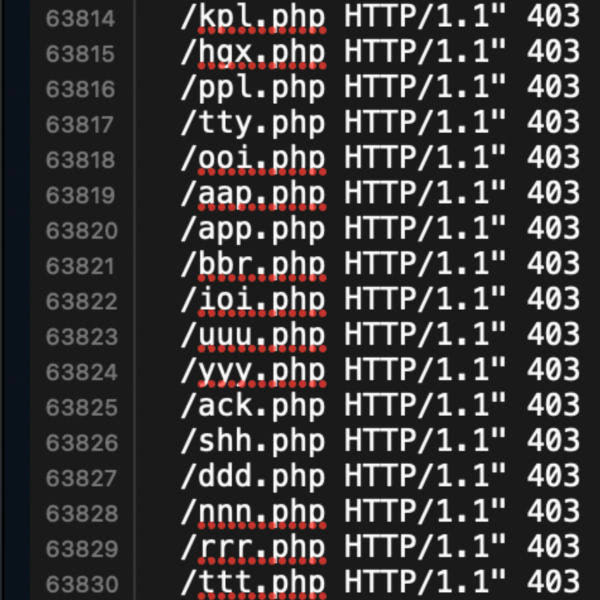
Good news! The 8G Firewall is updated to version 1.4. This latest update resolves numerous false positives and bugs that have been reported since version 1.3, when 8G was taken out of beta and officially launched last year. Continue reading »
I’ve written before about how to protect WordPress XML-RPC and why it’s important. In this quick post, I explain three easy ways to to disable WordPress XML-RPC to help improve the security of your WordPress-powered site. Continue reading »
Been getting hit with massive attacks on all sites. Very large VPN/proxy network. Relentless requests 24/7, thousands of requests every minute, just non-stop attacks. All URL requests targeting rogue PHP files. The attacks were weighing on precious server resources. Server held up fine but this nonsense needed to stop. So I wrote a tight little addon for my 8G Firewall. Blocks the entire attack with just a few clicks.. Continue reading »

I’ve been working on developing the 8G Firewall. Digging through log files and crunching the data, the big new trend I’m noticing is heavy scanning for easy targets, low hanging fruit. Bad actors are looking for any little hidden files stashed on your server. Mostly PHP files, also ZIP and RAR files, and other file formats commonly used for compressing and archiving content. Basically, anything that might contain useful information (like login credentials, database backups, email addresses, etc.). Also, 99% […] Continue reading »

BBQ Firewall is built to be powerful, lightweight, fast and flexible. It’s code base is kept super lean, leaving extra functionality out of core while supporting new features via simple addons. For example, this tutorial shows how to use an addon to display the total number of blocked HTTP requests on the plugin settings page. This can help you get a basic idea of the plugin’s effectiveness. Continue reading »

This tutorial is for users of my nG Firewall, version 8G or better. It explains how to enable logging for all blocked requests. This is useful for testing, debugging, and keeping an eye on things. Takes only a few minutes to set up, and of course it’s all open source and 100% free for everyone :) Continue reading »

After more than a year of beta testing, 8G Firewall is ready for use on production sites. So you can benefit from the powerful protection provided by the latest evolution of the nG Firewall (aka nG Blacklist). The 8G Firewall offers lightweight, server-level protection against a wide range of malicious requests, bad bots, automated attacks, spam, and many other types of threats and nonsense. 8G is a lightweight (only 17KB) strong firewall that provides site security and peace of mind. […] Continue reading »

The nG Firewall is a carefully crafted set of security rules for Apache and Nginx servers. nG may be applied via your site’s public root .htaccess file, or added via server configuration file. Once added, 8G provides powerful server-level protection against a wide range of malicious requests, bad bots, automated attacks, spam, and many other types of threats and nonsense. It’s a lightweight yet super strong firewall that improves site security and peace of mind. Continue reading »

After several months of development, the official Nginx version of the 7G Firewall is out of beta and ready for public use. If you are not familiar with 7G Firewall, check out the documentation for the Apache/.htaccess version. The Nginx version of the 7G Firewall works the exact same way, so I won’t bother repeating everything here. The only difference is the implementation, how to set it up on an Nginx server, which is explained in this post. Continue reading »

BBQ Firewall is a lightweight, super-fast plugin that protects your site against a wide range of threats. BBQ checks all incoming traffic and quietly blocks bad requests containing nasty stuff like eval(, base64_, and excessively long request-strings. This is a simple yet solid solution for sites that are unable to use a strong Apache/.htaccess firewall. Continue reading »

Pleased to announce that the 7G Firewall is updated to version 1.3 (September 3rd, 2020). Now available for download, 100% free and open-source as always. Continue reading »
The 7G Firewall was released about a year ago as beta, and has had time now to mature/develop into a stable release. So this is just a heads up that 7G is now officially out of beta and ready for use in live/production environments. Continue reading »
Around the end of December 2019 and then now well into January of 2020, I’m seeing a massive spike in aggressive malicious scanning for uploads-related targets. In particular, there are massive numbers of requests for URL targets involving uploadify, plupload, and similar. Typical scans hitting upwards of 30K–50K requests per attack. Just relentless exploit scanning on steroids. Continue reading »
This quick post is aimed at users of the 6G Firewall. The latest 6G update removes the IP-address blocking section to improve firewall compatibility and implementation. So now with the IP section removed, you may be asking “how to block an IP address with 6G?” Well good news, this tutorial explains how to do it. Continue reading »
![[ Stormtroopers Keeping Things Secure. ]](https://perishablepress.com/wp/wp-content/images/2019/security-obscurity.jpg)
ob·scure adjective 1. not discovered or known about; uncertain. In the purely literal sense, the concept of obscurity applies to every transaction on the Web. The HTTP request knows not, nor could possibly know, the actual response it will receive from the server. There is only expected response. Online nothing is certain until it is. Continue reading »
![[ 7G Firewall (Beta) ]](https://perishablepress.com/wp/wp-content/images/2019/7G-firewall.png)
This tutorial explains how to log requests that are blocked by the 7G Firewall. This is useful for testing, debugging, and just keeping an eye on things. Learn how to log requests from Apache mod_rewrite and download my custom 7G logging script. It’s a complete example that shows how to log rewrite requests via PHP. All open source and free :) Continue reading »







![[ Stormtroopers Keeping Things Secure. ]](https://perishablepress.com/wp/wp-content/images/2019/security-obscurity.jpg)
![[ 7G Firewall (Beta) ]](https://perishablepress.com/wp/wp-content/images/2019/7G-firewall.png)
